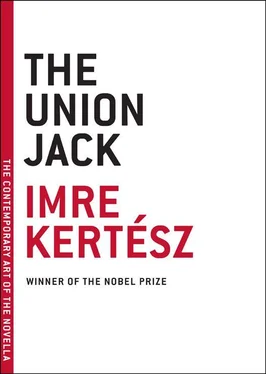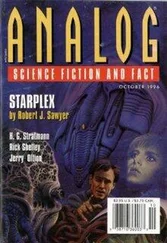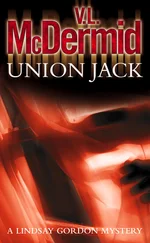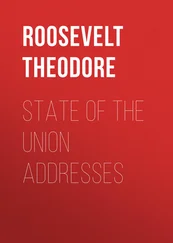Adam’s Apple . And now that I had mentioned the book that influenced my life so profoundly, with the peculiar determinacy of dreams of a revelatory nature, after some hesitation I also revealed to the friendly gathering where they had been urging me to tell the story of the Union Jack that the author of that book, Ernő Szép, without my being aware that he was the author of the book (by no means one of the most significant of his life’s works maybe, if indeed truly significant at all), around that time, that is to say when the disaster had not only long been undeniably visible, present and palpable, but nothing other than the disaster was visible, present and palpable, and, apart from the disaster, nothing else functioned, Ernő Szép was pointed out to me, a so-called “cub reporter,” on one or two occasions, in the erstwhile so-called “literary” coffee-houses and cafés which still operated at that time, albeit only as disaster coffee-houses and disaster cafés by then, of course, into which strayed only shadowy figures seeking some warmth, temporary shelter, temporary formulations. And on one or two occasions — perhaps even two or three — I, the “cub reporter,” was even introduced to Ernő Szép (who naturally never recalled my earlier introductions), purely for the sake of being able to hear him introduce himself with the phrase that has since attained legendary, nay, mythical status: “I
was Ernő Szép.” At this juncture, I proposed a minute’s silence to the friendly gathering of my former students who had been urging me to tell the story of the Union Jack. Because, I told them, as the years and decades pass not only had I not forgotten that form of introduction, it actually came to mind increasingly often. Of course, I said, you would have had to see Ernő Szép, you would have had to see the old chap who, before you would have been able to see him,
was Ernő Szép: a tiny old chap who seemed to be relieved of his own very weight, swept along the icy streets like a speck of dust by the wind of disaster, drifting from one coffee-house to the next. You would have had to see, I said, his hat, for example, a so-called “Eden” hat, of a shade that had evidently once been what was called “dove grey,” which now teetered on his tiny bird’s head like a battle-cruiser pummelled by numerous direct hits. You would have had to see his neat, hopeless-grey suit, the trouser legs bagging on to his shoes. Even then I suspected, but now I know for certain, that this introduction, “I
was Ernő Szép,” was not one of those habitual disaster jokes or disaster witticisms of this disaster city which, in the disaster era that had by then undisguisedly set in, were generally believed and accepted, because people could not believe, because they did not know or want to believe or give credence to anything else. No, that introductory form was a formulation, and a radical formulation at that, a heroic feat of formulation, I would say. Through this formulation Ernő Szép remained, indeed became the essence of, Ernő Szép, and at the very time when he already only
was Ernő Szép; when they had already wound up, liquidated and taken into state ownership every possibility by which Ernő Szép had once still been permitted to be Ernő Szép. Simply a lapidary formulation of the actual truth condition (the disaster), couched in four words, which no longer had anything to do with wisdom or lightheartedness. A formulation which lures nobody towards anything but with which nobody can ever be reconciled, and by that token a formulation with a far-reaching resonance — indeed, in its own way, a creation which, I will hazard a guess, may survive all of Ernő Szép’s literary creations. At this, my friends and former students started to mutter, some of them sceptically objecting that anyway the oeuvre was, so to say, “irreplaceable,” as they put it, and moreover Ernő Szép is at this very time gaining a new lease on life, at this very time people are starting to re-read and re-evaluate his works. I knew nothing, and in this instance once again don’t even want to know anything, about this, since I am not a literary man; indeed, for a long time now I have not liked, and do not even read, any literature. If I search for formulations, then I usually search for them outside literature; if I were to strive for formulations, I would probably refrain from formulations that are literary formulations, because — and maybe it suffices to leave it at this; indeed, there is truly nothing more that I can say — literature has fallen under suspicion. It is to be feared that formulations that have been steeped in the solvent of literature never again win back their density and lifelikeness. One should strive for formulations that totally encapsulate the experience of life (that is to say, the disaster); formulations that assist one to die and yet still bequeath something to posterity. I don’t mind if literature, too, is capable of such formulations, but what I see increasingly is that only
bearing witness is able to do this, possibly a life passed in muteness without being formulated
as a formulation . “For this cause came I into the world, that I should bear witness unto the truth”—is that literature? “I
was Ernő Szép”—is that literature? Therefore — and only now do I notice it — the story of my encounter with the adventure of formulation (and at the same time with the Union Jack) does not start, as I originally supposed, with Richard Wagner after all, but with Ernő Szép; in either case, however, one way or the other, I have to and had to start with the editorial office. In the editorial office to which my fantasy, under the influence of Ernő Szép, had borne me — under external circumstances ready, as ever, to comply with steadfast fantasy — in that editorial office, then, on a briefer and more condensed trajectory, so to say, though of course without leaving behind an intellectual trail of any kind, I trod the very same path that Ernő Szép had taken, from the unwittingness of wisdom and lightheartedness up to the “I
was Ernő Szép” type of formulation; all that I found on the site of the alleged erstwhile Budapest was a city that had tumbled into ruins, lives that had tumbled into ruins, souls that had been tipped into ruins, and hopes trampled underfoot amid those ruins. The young man about whom I am speaking here — I—was also one of those souls, stumbling around on the way to nothingness amid those ruins, although he (I) at the time still construed the ruins merely as some kind of film set and himself as an actor in a film — in any event, some splenetic, some acerbically modern film that was fraudulent in an acerbic and modern manner — a role that, being based entirely on the illusion seen from the auditorium, and oblivious to all disturbing circumstances (that is to say, reality, or the disaster), he (I) formulated as “I’m a journalist.” I can see the young man on drizzly autumn mornings, the fog of which he inhaled just like the rapidly evaporating freedom; around him I can see the set, the blackly glistening wet asphalt, the accustomed bends in familiar streets, their dilatations into the void over which the swirls of thinning fog gave hints of the river; the dank smell of the people who waited with him for the bus, the wet umbrellas, the hoarding plastered with garish posters which concealed the wartime rubble of a ruined building, on a site where today, forty years later, another ruin stands, a peacetime ruin, the wartime ruined building having been replaced by a peacetime ruined building, a decrepit, eight-storey monument to total peace, corroded by premature death, patinated by air pollution, vandalised by every sort of squalor, theft, neglect, infinite provisionality and futureless indifference. I can see the stairway up whose stairs he will hurry before too long, with the same sense of security that delusion-driven people have which had impelled him (me) to declare “I’m a journalist”—with a certain sense of self-importance, in other words, which even the stairway in itself nurtured, that already long non-existing stairway, which hinted at a then unambiguous reality, the reality of
Читать дальше












